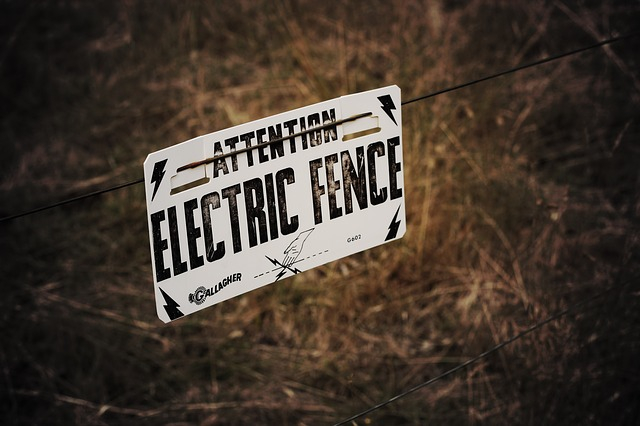Electric fence is not a common choice in Canada. In fact, while it's used for security in many parts of the world, here in Canada, we use it mainly for animal control. If you've ever wondered how does electric fence work, read on!
Like most Canadian fence companies, we don't do a lot of electric fence, but we can certainly supply (and sometimes install) it for our customers. Here's what you need to know.
Non Lethal
The first thing you should know, that many people don't, is that modern electric fence systems are usually non lethal. While there are still some older generation lethal electric fence systems out there that are usually used on sites like maximum security prisons in some countries, most are not.
The primary reason for this is that while electric fences have high voltage, they don't have very high amperage, and it's the amperage that's the truly dangerous part of anything related to electricity.
That means that electric fences aren't physically dangerous to animals or people under most circumstances - although it always pays to be careful just in case!
Pulsed - Not Constant
Another reason electric fences are not lethal is that they don't provide a constant current. Instead, the electricity travels down the wires in pulses. Which means you could potentially touch a wire and not get a shock one moment, and then get a shock the next. It also means that if you were to grab an electric fence wire, your hand would clench during the pulse, but release when it stopped. This is an important safety feature.
In fact, an easy way to test if an electric fence is live is to use something like a screwdriver, with a metal shaft and an insulated handle, touch a wire and touch another metal element of the fence (but only touch the handle!) If you hold it there for a second or two, you should see and hear a spark, if the fence is live.
Completing a Circuit
Electric fences are a circuit, which means that you need to complete the circuit to make them work. Fence companies use a variety of measures to do this, from installing wire "loops" to jump tensioning equipment at tension posts, to undergate cables to ensure that fences span openings as well.
When electric fences are used for security purposes, this also allows for monitoring of the fence. In these cases, the energizer (a special piece of equipment that creates the electrical current) will monitor each "zone" for short circuits, and when one occurs, a strobe light, siren or both will go off to alert you were a potential breach has happened.
Proper Insulation
The next important thing you need to know is that insulation is one of the most important factors for an effective and safe electric fence.
Insulators keep the electric fence wires away from the fence, which is often also metal, and could become electrified if there were a cracked or missing insulator. This could also create short circuits, which could render your fence less effective, or if it is monitored in some way, could create false alarms.
Electric Bear Fence
In Canada, electric bear fence is one of the most common types of electric fence requested. It's often installed on the outside of a chain link fence around remote work sites or waste management facilities, and usually, it's connected to solar panel, so it can run without mains power during the summer, and be turned off in winter when the bears area asleep.
While we don't often get asked for electric fence for animal control, we can provide advice, pricing and more, so if you need an electric fence around one of your sites, reach out and let's see what we can do for you!


